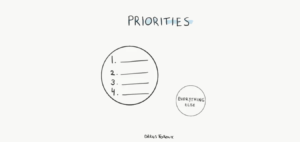Most of us agree that success never comes all at once. Nowadays, it is no longer enough to be successful in just one subject.
Therefore, a multidisciplinary mindset is indispensable.
Adapting to the innovations of the rapidly changing world and being able to use it efficiently is an example of success in itself.
Renowned author, entrepreneur, researcher, growth hacker and marketing genius Ryan Holiday shared his success plan on Quora. He also underlines that we can use this mindset in all fields, regardless of the subject.
Let’s take a closer look at the recommendations of Holiday, who has achieved success in many areas, about how we can stay development-oriented in the multidisciplinary age:
1) Always stay a student: The biggest danger you can do to yourself is to think you know everything about your main and side areas. So put your
ego aside and use your brain as a sponge for information, always feeling like a student.
“It is impossible for a man to learn what he thinks he knows.”
—Epictetus
2) Focus on negative feedback: If you always focus on the things you do well in what you do, your mistakes will go unnoticed. If Tim Ferris wants you to take a look at his writings, the first question he’ll ask is “Which part should I remove?” It is possible. You need the truth and your mistakes told more than compliments.
3) Find your plus, minus and equal: MMA trainer Frank Shamrock says he trains fighters with a system he calls “+,-,=”. He underlines that everyone should fight with someone better, someone worse, and their equal. Without making a sick comparison in your own life; You can communicate with people who are better, worse and at the same level than you. In this way, you can learn your own level more easily and stay focused on development while trying to gain experience in an area you do not know at all.
4) Take small steps: Pat Riley, one of the world’s most successful NBA coaches, defines excellence as:
“Excellence is always the gradual result of striving to do better”
The big improvements you will make happen through small and patient steps you take.
5) Talk less, do more: “Work so hard that you don’t have time to explain what you’re working on.”
The word that novelist Helen Simpson pinned to her desk is clear and precise: “Keep your mouth shut and keep working.”
While it’s sometimes helpful to talk about what you’re doing and boost your self-confidence, don’t let your talk get in the way of your work.
6) Start from the bottom: No matter what you do, don’t try to reach the top level in a top-down way. Trying to rise from the bottom is always the most instructive. I started my career as Robert Greene’s research assistant. Everything I learned during the process, I learned because I started from the bottom. So remember how important your starting point is.
7) Keep in mind the importance of deep work: Practice constantly to concentrate and keep your focus. The first step to embracing the subject you want to learn is to cut out all distractions and stay focused.
8) Always ask questions: Peter Drucker, one of the most successful strategists and consultants of the past century, sums up his work in a simple way:
“My greatest strength as a counselor is to remain ignorant and ask a few questions. I can only ask questions. The answers must be yours.”
The questions you ask always allow you to see more clearly in front of you.
9) Follow the process: Breaking the whole into pieces and moving forward from the smallest piece is one of Henry Ford’s key success principles. In the same vein, sports coach Nick Saban expresses the following words:
“Don’t focus on winning the championship or winning the game you’re playing. Focus on the smallest task before you and excel at it. Everything is piecemeal.”
10) Don’t break the chain: The “Don’t break the chain” method invented by comedian Jerry Seinfeld has a system that aims to make a habit and do it 365 days a year. From the first day to the last day, when you do what you need to do on the calendar, you mark it with an “X” and get this name because of the chain image that appears. Don’t break the chain to keep a habit going.
11) Slowing Down: Ultra marathon runner Rich Roll writes in his diary Finding Ultra:
“It’s not about going too fast, it’s never slowing down. Go ahead, don’t slow down, you’ll get better.”
Try to keep your pace!
12) Read voluntarily: Over the centuries, people have migrated, invested, got a job, quit their job, built relationships… and someone has already done the things you want to do in your lifetime. What you want to do is written in books. Reading them is much more important than you think.
13) Consume the right things: You can think of this as a classic input-output principle. If you have bad inputs, you will have bad outputs. Do not turn to the popular, try to consume the qualified. This will be reflected in what you produce.
14) Try to become an apprentice to someone with more experience: Apprenticeship has been associated with mastery for centuries. Marcus Aurelius also agreed:
“Go straight to the information seat.”
Whoever you look at in history, Leonardo da Vinci, Michelangelo, Benjamin Franklin… They all had a mentor.
15) Organize your knowledge: If you can’t categorize your knowledge and use it, it doesn’t matter what you learn; they will not work for you. Keeping your own notes and being able to look at them when you need them comes in handy.
16) Everyone can teach you something: You can learn great lessons, even from people you don’t like:
“Every person I meet is my master at some point.” —Emerson
17) Strategy with death grounds: This term is used in Robert Greene’s book War in 33 Strategies. Greene has studied that soldiers fight better when they risk death and accept that there is no turning back. You can integrate the same into your career or any pursuit you want to advance.
18) Forget passion: As emotional as the advice to follow your passions is, it can sometimes fail in practice. You don’t need passion to do truly great work. Goethe’s words are worth remembering:
“Absolute passion and activity in any form leads to bankruptcy.”
19) Use everything around you: Jerry Seinfeld answers a question about how he finds his jokes:
“I never work on material I can use. Every second of my being, ‘Can I do anything with this?’ I think. Research everything, learn from them, and incorporate it into your life every day.”
20) Don’t lie to yourself: Don’t lie to yourself about how hard you work, why you want to work, or what you really want. There may be differences between what people want from you and what you want from yourself. Be honest with yourself on this part.
✍ Editor’s Note and Suggestions:
Do not let the phrase “competition is increasing”, which is always mentioned, create a low motivation for you. With the right strategy, you can often improve your skills and create your own color. Do not forget that this era of increased competition is also called the “Age of Distraction”. This means that those you are in competition with actually succumb to distractions on many issues.
Most of the time we are competing with ourselves and many distractions, not with the people outside. If we live our lives with awareness, without losing our concentration and focusing on quality, of course, we will have a high probability of hitting our target from twelve.


















